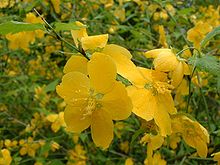Kerria (plant)
| Kerria japonica | |
|---|---|
 |
|
| Natural form | |
 |
|
| Cultivar 'Pleniflora' | |
| Scientific classification | |
| Kingdom: | Plantae |
| (unranked): | Angiosperms |
| (unranked): | Eudicots |
| (unranked): | Rosids |
| Order: | Rosales |
| Family: | Rosaceae |
| Subfamily: | Amygdaloideae |
| Tribe: | Kerrieae |
| Genus: |
Kerria DC. |
| Species: | K. japonica |
| Binomial name | |
|
Kerria japonica (L.) DC. |
|
Kerria japonica, the sole species in the genus Kerria, is a deciduous shrub in the rose family Rosaceae, native to China, Japan and Korea. It is named after William Kerr, who introduced the cultivar 'Pleniflora'. The scientific genus name is also used as a common name Kerria.
Kerria japonica grows to 1–3 m tall, with weak arching stems often scrambling over other vegetation or rocks. In the wild it grows in thickets on mountain slopes. The leaves are alternate, simple, 3–10 cm long, with a doubly serrated margin. The flowers are bright yellow, with five petals. The fruit is a dry single-seeded achene 4–4.5 mm long.
Kerria is valued in gardens for its bright yellow flowers, which appear in the spring. Two cultivars have gained the Royal Horticultural Society's Award of Garden Merit, K. japonica 'Golden guinea' and the double-flowered K. japonica 'Pleniflora'.
...
Wikipedia
